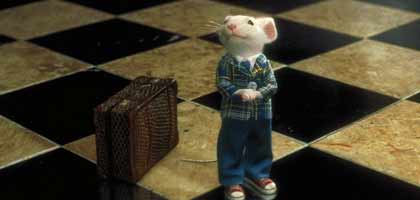
Stuart Little
USA 1999

Reviewed by Leslie Felperin
Synopsis
Our synopses give away the plot in full, including surprise twists.
New York City, the recent past. Mr and Mrs Little visit an orphanage to find a little brother for their natural son George. Charmed by one modest orphan, a talking mouse named Stuart, they adopt him. At first, George, disappointed with his new brother's diminutive stature, is stand-offish, but he eventually bonds with Stuart who later helms the boys' toy boat in the lake in Central Park. Snowbell, the family's Persian cat, is indignant at having a mouse for an owner and plots with his feline cronies to have Stuart removed.
The neighbourhood's top cat Red hires two mice, Mr and Mrs Stout, to claim they are Stuart's mouse parents. Thinking he has finally found his real family, Stuart bids a tearful goodbye to the Littles and leaves with the Stouts for Brooklyn, unaware of the mice's plan to hand him over to Red. Mr and Mrs Little learn that Stuart's biological parents died in a car crash and start searching for him. Meanwhile, the Stouts have a change of heart and tell Stuart the truth so he can escape. He makes it back to the house only to be pursued into Central Park by Snowbell and the cats. Realising his fellow cats plan to eat Stuart, Snowbell repents and helps him escape. The Little family is reunited at last.
Review
Like the 1997 children's film The Borrowers with its hotchpotch mise en scène, Stuart Little is set in an imaginary period where people have 40s hairstyles, 50s lifestyles and late-90s appliances. Forming a stylised vision of New York where - most fantastically of all - a moderately affluent middle-class family can afford a house on Central Park West, these retro trappings are like a thread leading the film back to its source, E. B. White's 1945 picaresque novella about the mouse son of a kindly family of New Yorkers. With delightful indirection, White's first sentence skirts gingerly around the nature of Stuart's genesis: "When Mrs Frederick C. Little's second son arrived, everybody noticed that he was not much bigger than a mouse." But even so, the book implies throughout that Stuart is the Littles' natural son. Presumably working on the assumption that contemporary audiences won't accept - and might even be repelled by - the notion of a woman whelping a rodent, screenwriters M. Night Shyamalan (writer-director of The Sixth Sense) and Greg Brooker make it plain from the outset that Stuart is adopted by, and not born into, the Little family.
This takes the film in a whole new direction from White's novella. Gone are all the story elements that innocently present bestiality or at least vaguely perverse inter-species relationships as everyday events. (The book's Stuart falls in love with a bird and later dates a two-inch-high teenager.) Bringing to mind Michel Foucault's analysis of the "repressive hypothesis" which explains how modernity mistakenly caricatures 19th-century thought as devoid of carnal content when it was in fact obsessed with pathologising sexual behaviour, White's Stuart Little belies our stereotypical conception of 20th-century children's fiction as anodyne and innocent. Paradoxically, the film version is a much more wholesome affair, didactically exploring the emotional fragility of adopted children, sibling rivalry and blended family life. Where White's Stuart is a kind of young, 20s romantic, this Stuart is pre-pubescent, modestly trousered and sexless. Where White's book swerves and dips with strange adventures for its hero and a startlingly oblique ending, Stuart Little the film runs on straight, conventional narrative rails, looping back to dramatic stasis as predictably as the toy railroad in the Littles' basement.
As such, it's perfectly entertaining fare, sprightly, funny and never too cloying. Director Rob Minkoff, who co-directed The Lion King, in collaboration with visual-effects supervisor John Dykstra (2001: A Space Odyssey), coaxes charmingly nuanced movements and facial expressions from the computer-generated animals who carry the plot more than the slightly dazed-looking live actors. Michael J. Fox is impeccably cast for Stuart's voice, high pitched and happy natured. He's upstaged only by Nathan Lane's Snowbell, the family cat who, like Lucifer, gets all the best lines. Refusing to help Stuart escape from a washing machine, he saunters off, tail aloft, explaining that he's "got to stare at traffic, yawn, lick myself. And believe me, that can take hours if you do it right." Maybe there's a streak of perversity in Stuart Little after all.
Credits
- Director
- Rob Minkoff
- Producer
- Douglas Wick
- Screenplay
- M. Night Shyamalan
- Greg Brooker
- Based on the book by E.B. White
- Director of Photography
- Guillermo Navarro
- Editors
- Tom Finan
- Julie Rogers
- Production Designer
- Bill Brzeski
- Music/Music Conductor
- Alan Silvestri
- ©Global Entertainment Productions GmbH & Co. Medien KG
- Production Companies
- Columbia Pictures presents a Douglas Wick and Franklin/Waterman production
